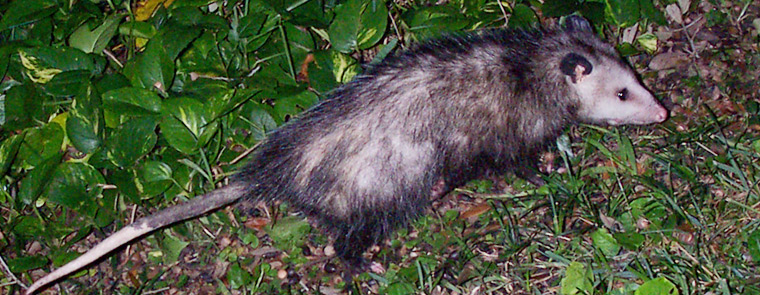-
info@aaanimalcontrol.com
Call us for help in your town
Humane Wildlife Education
What Diseases Do Opossums Carry?
Opossums as a species are not particularly prone
to carrying bacteria in the same way other pest
animals such as rats, as the biology of the animal
includes a body temperature that is significantly
lower than other species. However, there are
plenty of conditions that can be carried, and are
sometimes transmitted by opossums to people and to
other animals too.

- Rabies
- Leptospirosis
- Equine Protozoal Myeloencephalitis
- Tularemia
- Salmonella
This is one of the biggest concerns that many people will have about coming into contact with opossums, as they are animals that are large enough to survive an attack by another rabid creature. There are relatively few examples of opossums transmitting rabies to humans, and as they are naturally nocturnal people will usually be cautious about coming into contact with opossums active during the daytime.
Leptospirosis is a disease that is found in the feces and urine of many different types of small animals, and is usually encountered when people are cleaning up after an opossum infestation. The spores of the disease are released when the feces is disturbed, and it can cause liver problems, meningitis and even death in a small number of cases.
While EPM is not a condition that can affect people, it is certainly of concern to those who have horses as it can have some serious effects on the animals. This is another disease that is usually transmitted through the feces of the opossum, although those who have an opossum infestation in a stable where the horses may be kept may find that several animals may be infected by soiled feed and hay.
Tularemia is a condition that can be transmitted when people come into direct contact with an opossum or its fleas. A high fever is one of the main symptoms of the disease being present in people, although it can also include an ulcer, while pneumonic tularemia is the most serious variety and effects can include difficulty breathing and severe chest pain.
This disease is one of the most common bacterial infections in the world, and causes symptoms including diarrhea and vomiting, which can be more serious in those with compromised immune systems. The disease is usually transmitted through contaminated food and water, which means that when an opossum infestation is found in a property it is very important to deal with the situation quickly and effectively, while any contaminated food should be disposed of.
How much does opossum removal cost? - get the lowdown on prices.
How to get rid of opossums - my main opossum removal info guide.
Example opossum trapping photographs - get do-it-yourself ideas.
Opossum job blog - learn from great examples of opossum jobs I've done.


















